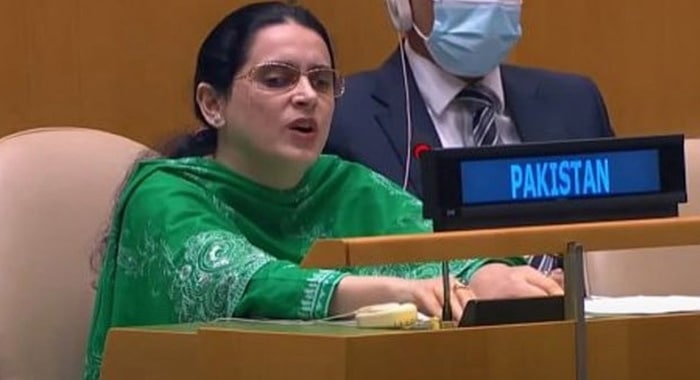In a powerful address at the United Nations Security Council, Pakistan’s Permanent Representative Saima Saleem called on India to abandon its campaign of state-sponsored terrorism and engage in meaningful and result-oriented dialogue for the peaceful resolution of the Jammu and Kashmir dispute.
Speaking during an open debate, Saima Saleem strongly condemned India’s continued disinformation campaign, calling it a deliberate attempt to deflect attention from its grave human rights violations. “India’s distorted narratives and evasive rhetoric cannot obscure the reality of its occupation, brutality, and regional aggression,” she asserted.
Saleem accused India of consistently targeting innocent civilians in Indian Illegally Occupied Jammu and Kashmir (IIOJK) and across the Line of Control (LoC). “India is directly responsible for indiscriminate killings and injuries inflicted upon unarmed civilians. Its unprovoked aggression has no justification,” she said.
Referring to the assassination of Sikh leader Hardeep Singh Nijjar in Canada and a failed attempt to assassinate Gurpatwant Singh Pannun in the United States, Saleem said these incidents exposed India’s alarming reach of extraterritorial terrorism. “India is not just a threat to Pakistan, but to global peace and security. Its record of orchestrating targeted killings abroad speaks for itself,” she told the Council.
On the Pulwama incident, she reminded the Council that Pakistan, along with the international community, had condemned the attack and demanded an independent investigation. “Had India truly sought justice, it would have welcomed a credible, neutral, and transparent probe. Its refusal only raises more questions,” she added.
Criticizing India’s unilateral decision to suspend the Indus Waters Treaty, Saleem said India had attempted to weaponize water — a basic human right. “These rivers are the lifeblood of over 240 million Pakistanis. Denying access to water is not just illegal — it is an act of war. The international community must not remain silent,” she warned.
The ambassador also drew attention to India’s cross-border military aggression in early May, when Indian forces carried out unprovoked attacks between May 6 and 10, killing 40 civilians — including 7 women and 15 children — and injuring 121 others, among them 10 women and 27 children. “This was not self-defense. It was naked aggression, a clear violation of the UN Charter,” she said.
Highlighting the persistent threat India poses to Pakistan’s internal security, Saleem said India continues to fund and support terrorist groups like the Tehrik-i-Taliban Pakistan (TTP), Balochistan Liberation Army (BLA), and Majid Brigade. “These Indian-sponsored outfits have carried out deadly attacks targeting civilians, including the recent bombing of a school bus in Khuzdar that killed and injured several innocent children. These are war crimes disguised as proxy warfare,” she emphasized.
Saima Saleem concluded with a firm message to India and the international community: “If India truly believes in peace, regional stability, and the principles of the UN Charter, it must first end its policy of state terrorism, halt the oppression of the Kashmiri people, honor its international and bilateral commitments, and return to the table for sincere and structured dialogue. The path to lasting peace in South Asia lies through justice in Kashmir — as per UN Security Council resolutions and the will of the Kashmiri people.”
She called on the UN and world powers to hold India accountable for its actions and play an active role in facilitating a peaceful resolution to the Kashmir dispute.





